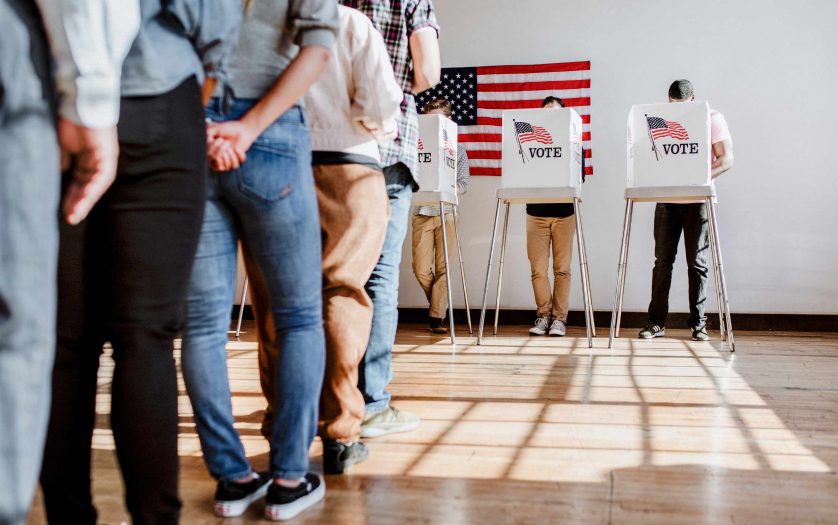Limiting the vote for individuals with intellectual disabilities is limiting democracy

A citizen’s right to vote in America is hardly guaranteed for those who have intellectual disabilities.
Even the Voting Rights Act of 1965, a piece of federal legislation renowned for ensuring access to the vote, excludes individuals “by reason of…mental incapacity” from voting. Forty-one state governments have provisions in their constitutions that mirror the language in the Voting Rights Act and strip individuals with intellectual disabilities of their right to vote. These measures silence the voices of disabled citizens and impair American democracy.
Provisions which restrict the right to vote for individuals with intellectual disabilities became popular in state constitutions in the late 19th and early 20th centuries. These archaic policies were just one tool used by the eugenics movement to “improve” humanity by eradicating so-called “undesirable” populations (read: individuals with disabilities). State voting provisions born from this era perpetuate the ideology of the eugenics movement by supposedly “protecting” society from the votes of those who are considered to have “diminished mental capacity.” Indeed, proponents of these policies believe that banning individuals with intellectual disabilities from voting is necessary to uphold “the validity of the voting process by distinguishing between those who understand the nature of voting.”
While maintaining the integrity of American elections is certainly a worthy purpose for any piece of voting legislation, restricting the voting rights of disabled individuals hardly aligns with this intention. Such logic operates on the faulty premise that individuals with intellectual disabilities are not capable of understanding the nature of voting. There is a wide range of impairments that may lead individuals to be intellectually disabled, so intellectual disability is not synonymous with an inability to comprehend the essence of voting. Furthermore, withholding access to the vote based on arbitrary questions about the ability of marginalized groups to comprehend the nature of voting (think of literacy tests for Black Americans) does more to degrade the validity of the electoral system than to uphold it.
Barriers to voting for individuals with intellectual disabilities are more than relics of a movement that advocated for the extinction of disabled individuals—these provisions mark an egregious failure of America’s representative democracy. Not only do these policies literally bar individuals with intellectual disabilities from voting, but they also pose symbolic barriers to citizenship for individuals with intellectual disabilities. Left unaddressed, these symbolic barriers will only continue to convey to disabled Americans, who are already less likely to believe in the efficacy of their political participation, that their voices are less valuable, and thereby discourage them from participating in elections. This is an especially terrifying notion given that the voting policies in the Republican agenda, such as a ban on absentee ballots, are set to disproportionately threaten the right to vote for individuals with disabilities.
In this whirlwind of new and old challenges to disabled individuals’ right to vote, we can no longer ignore the vulnerabilities created by the antiquated provisions of the Voting Rights Act and state constitutions. People with disabilities have shown incredible resilience in making their voices heard in elections despite the centuries of obstacles put in front of them, and it is time for the American government to finally do its part to secure their right to vote. Both the federal government (via the Voting Rights Act) and state governments (via their constitutions) must terminate all provisions that allow for the disenfranchisement of individuals with intellectual disabilities. However, it is unlikely that public officials will do this of their own volition: it is up to us to apply the pressure.
Call your representatives in the federal government and tell them to fight for provisions that promote the right to vote for disabled individuals. Write letters to your state legislators asking them to amend constitutions that disenfranchise individuals with intellectual disabilities. The more that we discuss this issue and hold our representatives accountable, the more likely it is that our governments will amend legislation that disenfranchises individuals with intellectual disabilities.
The right to vote is a pillar of American democracy, but so long as this right only applies to a certain subsection of American citizens, this pillar will continue to crack. Left unremedied, these cracks will put American democracy in danger of collapse.
Featured Stories
-
 I finally got hearing aids at age 26, after a lifetime of feeling stigmatized
I finally got hearing aids at age 26, after a lifetime of feeling stigmatized
-
 Preparing for the parenting life when you have a disability
Preparing for the parenting life when you have a disability
-
 4 fun cities to visit on your self-care reset trip
4 fun cities to visit on your self-care reset trip
-
 How to manage an ADHD diagnosis
How to manage an ADHD diagnosis
-
 Is the United States facing a shortage of nursing homes for people with disabilities?
Is the United States facing a shortage of nursing homes for people with disabilities?


